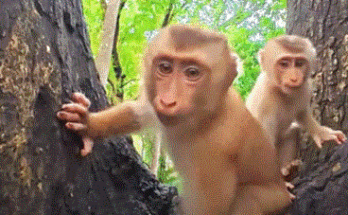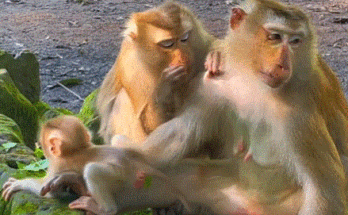Amid the ancient, moss-covered stones of Angkor Wat, the morning sun filtered through the dense canopy of trees, casting golden streaks on the forest floor. Birds sang their melodies, and the air was thick with the earthy scent of the jungle—but one sound stood out sharply above all others: the tiny, desperate cries of a baby monkey.

Separated from its mother, the little macaque wandered cautiously through the ruins, its small hands clutching the rough stone walls as it searched for a familiar face. Every step it took was tentative, each movement punctuated by the soft whimpers of fear and longing. The forest, usually bustling with life, seemed to pause in sympathy for the fragile creature.
Moments earlier, the baby had been playing near its mother, leaping from tree to tree and exploring the intricate carvings of the centuries-old temples. But in a sudden distraction—a falling leaf, the distant call of another monkey—the tiny macaque had become separated. Panic set in as it realized the warm presence of its mother was gone. The fear in its eyes was unmistakable, mirroring a universal instinct: the yearning for the comfort of family.
As it wandered, its cries echoed through the forest, bouncing off ancient stones, calling out into the vast emptiness. A passerby, drawn by the plaintive sound, paused to watch. The baby monkey’s small body trembled, and its little hands gripped a pillar for support. There was an innocence in its gaze that spoke directly to the heart, a silent plea for help that transcended species.
Slowly, carefully, the rescuer approached. Every movement was deliberate, gentle, meant to reassure rather than alarm. The baby monkey paused, its tiny frame stiff with fear. After a tense moment, curiosity and trust overcame instinctive wariness, and it allowed itself to be cradled. For the first time since being separated, there was warmth, a sense of safety, and yet—its longing for its mother remained unbroken.
The forest seemed to hold its breath as the little macaque clung to the rescuer’s arm, its cries softening into quiet whimpers. From afar, other monkeys called to one another, their voices like a distant lullaby, sparking hope in both the rescuer and the small creature. There was an unspoken understanding: this story was about more than just a lost baby—it was about love, vulnerability, and the delicate balance of life in the wild.
For hours, the baby monkey wandered cautiously with gentle guidance, searching for any sign of its mother. Each rustle of leaves and distant call ignited hope, only to be followed by the heavy weight of disappointment when familiar eyes did not appear. Yet, amidst the fear, there was resilience. With every trembling step, the little macaque displayed a courage that belied its size.
This encounter was not just a moment of fleeting human intervention. It highlighted a larger truth: the fragility of wildlife habitats and the impact of human activity on the lives of animals. The forests around Angkor Wat, though majestic and ancient, are not immune to the pressures of tourism, urbanization, and habitat loss. Stories like this baby monkey’s serve as a poignant reminder of why conservation matters.
As the sun began to dip behind the towering temple spires, casting long shadows across the forest floor, there was still no sign of the mother. But there was hope—the baby monkey had survived the day, protected, observed, and guided by compassionate hands. Its journey, though fraught with fear, reflected an unyielding spirit and the universal need for love and safety.
The story of this little macaque is more than a fleeting moment of sadness. It is a testament to the enduring bonds of family, the courage found in vulnerability, and the empathy that humans can show toward the voiceless. Watching its small form climb, cry, and cling in the ruins of Angkor Wat is a powerful reminder: life, in all its forms, is precious and interconnected.
As you watch this baby monkey’s journey unfold, take a moment to reflect on the fragile beauty of the natural world. Every rustling leaf, every distant monkey call, every tiny hand clinging for comfort tells a story of resilience and hope. And perhaps, in some small way, we are called to protect and honor these stories, ensuring that the forests of Angkor Wat continue to echo with the cries—and the triumphs—of its wild inhabitants.


